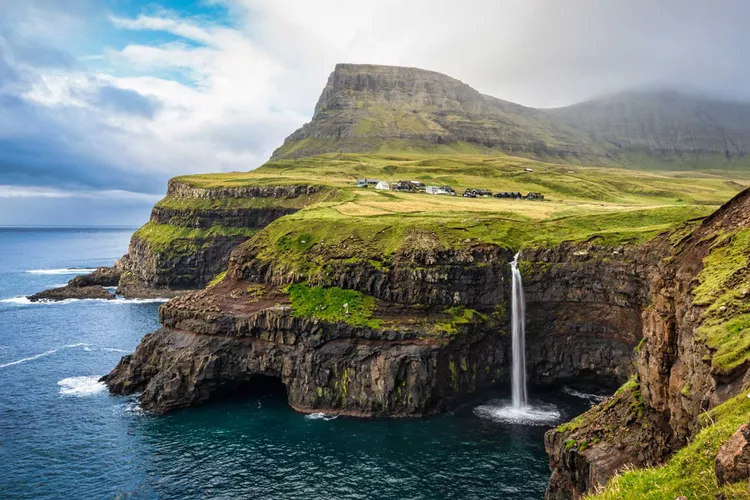With charming new hotels and gourmet restaurants, the remote Scandinavian archipelago is ready for a new wave of visitors.

There’s a monumental beauty to the Faroes, a necklace of 18 volcanic isles in the North Atlantic between Norway, Scotland, and Iceland. Jagged cliffs drop into fjords, waterfalls spray toward the sky on gusty winds, and thick fog envelops stark moorlands (the Faroese language has 40 words for the meteorological phenomenon). It’s tempting to get lost amid these landscapes while imagining yourself a shepherd or a Viking settler.

With the recent debuts of smart hotels, gourmet restaurants, and charming cafés—plus a maze of roads, bridges, and tunnels connecting the islands—it’s worth exploring what modernity has to offer. This road-trip itinerary winds around three of the archipelago’s largest islands, combining sights that are new, ancient, and otherworldly.
Why Your Next Trip Should Be to This Sleepy Icelandic Town
Day 1
Home to the main airport, Vágar Island has six villages, the smallest of which, Gásadalur, has only 10 full-time residents. You’re here to see Múlafossur, a magnificent waterfall that drops 500 feet into the North Atlantic. From there, drive 20 minutes south to colorful Sandavágur, a village wedged between a frigid bay and the western slope of Trollkonufinger Mountain. After snapping photos of the town’s red-roofed church, built during World War I, swing by Fiskastykkið (entrées $16–$19), a café serving Nordic specialties like hot-smoked-salmon salad with braised rhubarb. Spend the night in a traditional grass-roofed cottage at View to Drangarnar, Tindholm end Mykines (house from $369), in the village of Bøur.

Day 2
A 45-minute drive (part of which winds through a tunnel) brings you to the capital, Tórshavn, located on the island of Streymoy. Here, you’ll find brightly painted houses and atmospheric pubs alongside sod-roofed dwellings and 19th-century churches. Browse traditional yet on-trend Faroese knitwear at Ullvøruhúsið, then stop by the National Gallery of the Faroe Islands to admire seascapes by renowned homegrown painter Sámal Joensen-Mikines. Enjoy a slice of wild-berry cheesecake in the sunny backyard of the Paname Café. Or splurge on a 17-course tasting menu at Koks (tasting menus from $310), a Michelin two-starred restaurant set inside a 280-year-old farmhouse on Lake Leynar. The restaurant utilizes regional practices of salting, smoking, and fermenting to create innovative dishes like steamed deep-sea crab with pickled-leek jam. After a day of sightseeing, retreat to the Havgrím Seaside Hotel (doubles from $425), a former private residence recently transformed into an elegant coastal escape, with 14 rooms done up in shades of powder blue and cream.

Day 3
Last month saw the unveiling of a new tunnel—complete with a light installation by Faroese artist Tróndur Patursson—connecting the islands of Streymoy and Eysturoy. Once you’ve arrived on Eysturoy, head north toward Gjógv, a quaint village named for the sea-filled gorge that runs through it. Order a glass of wine at Gjáarkaffi, a stone-walled café with bright red trim and picnic seating. Afterward, check in to your simple, homey room at Gjáargarður Guesthouse (doubles from $165), where there’s live music and Faroese folk dancing every Wednesday evening.





